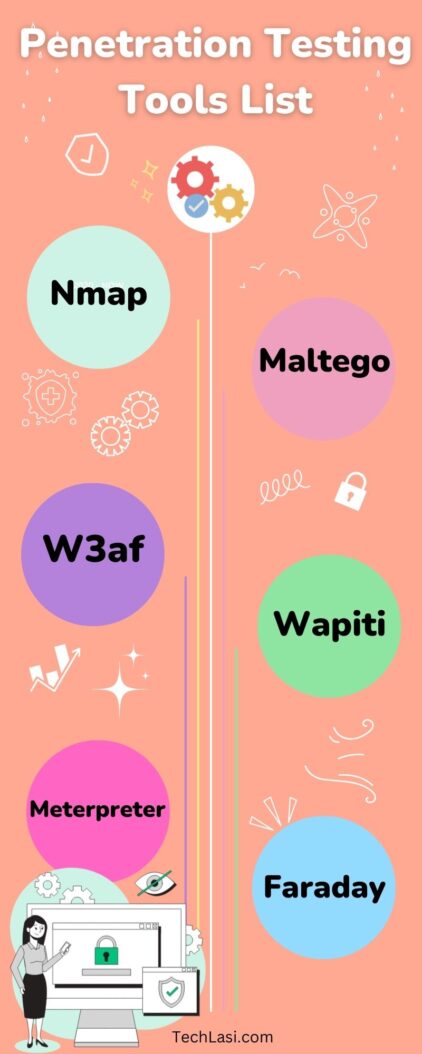Penetration testing, also known as pen testing or ethical hacking, is the practice of testing a computer system, network, or web application to find security vulnerabilities that an attacker could exploit. Open source penetration testing tools provide a free and customizable way for security professionals and enthusiasts to identify weaknesses in their systems. This article will explore 23 popular open source penetration testing tools.
Gathering Information with Open Source Reconnaissance Tools
The first step in any penetration test is typically information gathering and reconnaissance. These powerful open source reconnaissance tools help collect information about the target system prior to launching attacks.
Nmap
Nmap is possibly the most popular and versatile open source security scanner in existence. This free network mapper can reveal hosts, services, operating systems, packet filters, firewall rules, and more. Nmap has become an essential information gathering tool for penetration testers during reconnaissance.
Maltego
Maltego offers comprehensive reconnaissance through an interactive data mining interface. This open source intelligence tool visualizes the relationships between pieces of information from various sources found on the internet. Maltego Community Edition is available free for personal use.

Exploiting Vulnerabilities with Open Source Web App Test Tools
Once enough information has been gathered about the target system, the next phase is attempting exploits. These open source web application security scanners automate the process of finding and verifying vulnerabilities.
OWASP ZAP
The OWASP Zed Attack Proxy (ZAP) is an easy-to-use integrated penetration testing tool for finding vulnerabilities in web applications. ZAP provides automated scanners as well as a set of tools for those who want to find security vulnerabilities manually.
W3af
w3af, short for Web Application Attack and Audit Framework, identifies over 200 web app vulnerabilities. This open source web application security scanner features a plug-in architecture, enabling easy extension and customization for specific testing needs.
Wapiti
Wapiti allows security professionals to audit the security of web applications by performing “black-box” scans to detect flaws in a website’s attack surface. While using this command-line web application vulnerability scanner, testers can remain anonymous while probing for SQL injections, XSS attacks, and more.
Executing Exploits with Open Source Network Pen Testing Tools
In addition to web vulnerabilities, penetration tests also examine vulnerabilities in networks and operating systems that could enable exploits. These open source network security tools execute various scans and attacks.
Metasploit Framework
Developed by Rapid7, Metasploit Framework is likely the most popular open source exploit development and execution tool among pen testers. This comprehensive pen testing solution provides hundreds of exploits, payloads to leverage vulnerabilities, and reconnaissance plugins.
sqlmap
sqlmap helps penetration testers find and exploit SQL injection vulnerabilities in databases. This powerful SQL injection tool comes with a powerful detection engine, many niche features for advanced users, and a broad range of switches lasting different results.
Social Engineer Toolkit (SET)
The Social Engineer Toolkit (SET) focuses specifically on simulating social engineering attacks. This open source pen testing framework enables IT admins to test employees’ susceptibility to phishing, drive-by attacks, and other schemes leveraging human vulnerabilities.
Maintaining Access with Open Source Backdoors
Once penetration testers gain access, they need to keep that access open to demonstrate the risk. Backdoor tools enable ethical hackers to maintain access for more thorough testing.
Netcat
Often referred to as the “Swiss Army knife” for penetration testing, Netcat offers connectivity capabilities allowing attackers to open ports and send data between systems. This handy network utility makes maintaining access simple for those penetrating network perimeters.
Meterpreter
Meterpreter provides an advanced, dynamically extensible payload that penetration testers can customize to compromise target systems in a way that keeps networks open to the attackers. As part of the Metasploit framework, this open source attack payload remains resident to allow ongoing access.
Covering Tracks with Open Source Clean-Up Tools
Ethical hackers also need to cover their tracks to avoid detection, then restore target systems to their original state when tests conclude. These open source tools help clean up traces of scanning and exploits.
Nessus
Although Nessus offers comprehensive vulnerability scanning capabilities, this widely adopted pen testing product also features compliance and configuration auditing. These extended assessments help penetration testers clean up after scanning and exploiting vulnerabilities.
Open Source Pen Testing Tools for Mobile Apps
With mobile adoption continuously expanding, ethical hackers need tools focused on finding weaknesses in mobile apps that could allow malware attacks and data breaches. These open source options fill that mobile pen testing need.
drozer
Developed by MWR InfoSecurity, drozer enables security professionals to search for security vulnerabilities in apps and devices running the Android operating system. This comprehensive security and attack framework helps pen testers save time while amplifying effectiveness.
idb
idb serves as a flexible command line interface offering extended capabilities for iOS app security assessments. Penetration testers leverage this open source tool to automate time-consuming analysis and manipulation of iOS apps, speeding security testing.
Open Source Password Cracking Tools
Penetration testers must test the strength of passwords to highlight risks of brute force and dictionary attacks cracking into systems. These open source password crackers identify weak credentials.
John the Ripper
John the Ripper exemplifies perhaps the most widely used free password cracking software tool. This fast password cracker enables penetration testers to uncover weaknesses in account passwords on various platforms.
Hashcat
Hashcat touts itself as the self-proclaimed world’s fastest CPU-based password recovery tool, enabling over 200 million guesses per second. Pen testers leverage this open source password cracker’s highly optimized code and GPU support to break hashed passwords.
Maintaining Anonymity with Open Source Tunneling/Proxy Tools
Penetration testers must also maintain anonymity to discreetly uncover vulnerabilities. These free proxies and VPN tools provide ethical hackers with tunnels to mask their origin when scanning and attacking systems.
Tor
The Tor browser enables private, anonymous communication by directing internet traffic through a worldwide volunteer network of servers to conceal users’ locations. This free software routes traffic through multiple layers of encryption and peer connections, hiding penetration testing activities.
ProxyStrike
ProxyStrike offers free public proxy servers supporting HTTP, HTTPS, FTP and SOCKS protocols while hiding the real IP address and geolocation of users. Penetration testers rely on this free proxy service’s residential IP addresses to mask scanning and maintain anonymity.
Open Source Reporting Tools for Pen Testing Results
Documenting vulnerabilities uncovered during penetration tests provides clients with the necessary foundation to strengthen security defenses. These open source options help generate reports.
Faraday
Faraday integrates with multiple pen testing tools to correlate and analyze testing data, then informs users about vulnerabilities detected in apps, sites, networks, and systems. This free report aggregator simplifies reporting for senior leadership and less technical audiences.
Conclusion
This exploration of 23 popular open source pen testing tools reveals only a sample of the many free options available to help cybersecurity teams and enthusiasts perform penetration tests. Each scanner, exploit framework, proxy, password cracker, and reporting tool serves a purpose during different phases of vulnerability assessments. Security-minded IT professionals looking to enhance skills through hands-on ethical hacking can leverage these freely available resources to uncover weaknesses, strengthen networks against outside attacks, and gain employable skills in the process.
FAQs
What are the main phases of penetration testing?
The main phases of a penetration test often include reconnaissance, scanning for vulnerabilities, gaining access through exploits, escalating privileges, maintaining access, covering tracks, and reporting. Ethical hackers rely on different tools during each phase.
Is open source pen testing software legal?
Using open source penetration testing tools in an authorized manner against systems you own or have permission to test is completely legal. However, illegally accessing systems you don’t own or have no permission to test constitutes hacking, which carries severe legal penalties.
Can beginners use Kali Linux?
Kali Linux provides a broad range of free network security tools frequently leveraged for penetration testing. While extremely versatile, Kali Linux requires advanced technical skills. Beginners may want to build core competencies on other systems before attempting to use this pen testing distribution’s advanced capabilities.
What programming languages help with pen testing?
While penetration testers depend more on scanners and frameworks, learning programming languages like Python, Ruby, and Perl often proves useful for customizing exploits and tools. Understanding Linux shell scripting also simplifies executing commands.
Should I pen test my own network first?
Before attempting to uncover vulnerabilities in other networks, first perform penetration tests on systems you own and manage yourself. Testing your own environment provides a legal way to develop skills using open source pen testing tools before progressing into ethical hacking as a profession.
- What is One Challenge in Ensuring Fairness in Generative AI: The Hidden Bias Problem - August 15, 2025
- How Small Language Models Are the Future of Agentic AI - August 15, 2025
- What Are the Four Core Characteristics of an AI Agent? - August 15, 2025

